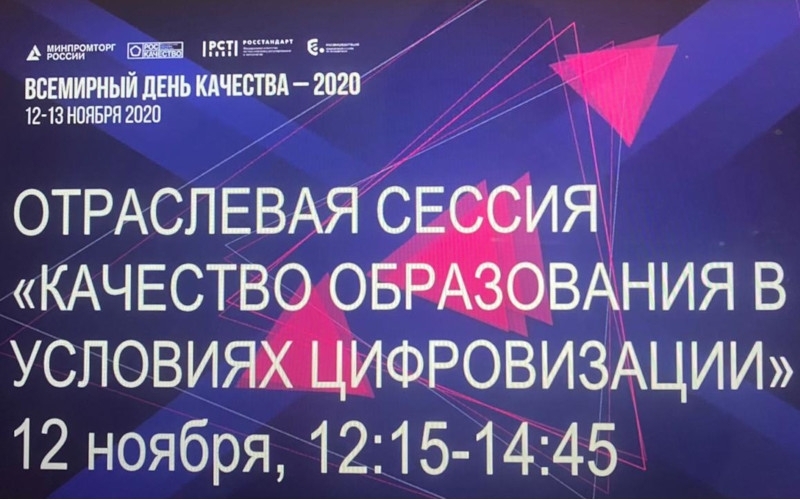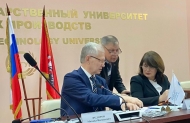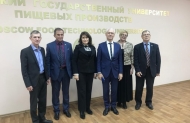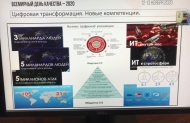
On November 12, Roskachestvo held an online forum “World Quality Day 2020”. The Eurasian Peoples' Assembly was a partner of the event.
The Council for Science and Continuing Education of the Eurasian Peoples' Assembly, within the framework of the conference, held an Industry Session “Quality of Education in the Context of Digitalization”. More than 150 representatives of Eurasian countries took part in it, 16 speakers from Russia, Serbia, Tajikistan, Sweden made their reports.
The session was moderated by Mikhail Fedorov, Deputy Secretary General of the Eurasian Peoples' Assembly, Chairman of the Commission on Education and Youth Policy of the Council of the Russian Academy of Sciences (RAS) for Eurasian Economic Integration, and Nina Aniskina, Rector of the Pastukhov State Academy of Industrial Management, leading auditor of the European Organization for Quality.
Andrei Belyaninov, Secretary General of the Eurasian Peoples' Assembly greeted the participants of the Industry Session on education.
The following professors presented the reports:
- Mikhail Kiselev, General Director of ANO “Human Capital Development” of the Moscow Government, Rector of “Technograd” at VDNKh, mentor of the “Skolkovo” Foundation;
- Ali Rashidi, Director of the International Department of Folk University, Chairman of the Council of the EQAVET Support System (EU Quality Model for Professional Education) in the EU and Eastern Europe (Sweden);
- Vladimir Azarov, Institute of Track, Construction and Structures of the Russian University of Transport (MIIT), Director of the Foundation “Non-profit organization “European Centre for Quality”;
- Irina Tyutkova, Moscow State University of Food Production (MGUPP), member of the Council for Science and Continuing Education of the Eurasian Peoples' Assembly;
- Alexander Morozov, Chief Researcher of the Institute for Education Management of the Russian Academy of Education.
The speakers raised the following issues in their speeches,:
- How has digitalization affected the quality of personnel training and what are the global trends in the new educational strategy?
- The COVID-19 pandemic has accelerated digitalization in education. How did this affect the quality of training?
- Are parents and teachers ready to adequately perceive distance education, which, in fact, is partly entrenched in the pedagogical practice of educational institutions of different levels?
Answering these and other questions, the participants in the discussion agreed that the processes of digitalization in education in various forms are already a reality of today. Scientists shared their experience of working in new conditions and emphasized the need for systematic meetings of specialists in the field of education to develop common approaches to training.
Professor Vladimir Lopatin, Scientific Director of the Republican Research Institute of Intellectual Property, Chairman of the Interstate and National Technical Committees for Standardization MTK550 / TK481, Expert of the Russian Academy of Sciences, highlighted in his report the priorities and conditions of competitiveness in the transition to the digital economy as part of Eurasian integration: 1) the transition from information indicators “Knowledge Economy” (patents and publications) to the performance indicators of the intellectual property economy; 2) educational program on economics, law and intellectual property management for teachers and professors, the leadership of all ministries and departments, as well as top management of corporations and holdings; 3) inclusion of competencies on intellectual property issues in educational and professional standards.
Professor Muazzam Ansori, rector of the Tajik Pedagogical Institute in Penjikent (Tajikistan), and Elena Basargina, Director of the Gnezdilov Gorno-Altai State Polytechnic College, demonstrated in their speeches and videos a unique experience of integrating their educational institutions with business, building models of practice-oriented education.
Andrey Kalinin, project manager of the architectural company AKVK & Partners, senior lecturer at the Architecture Department of the Peoples' Friendship University of Russia (RUDN), winner of the International Competition for the best architectural project “School of the Future” in Helsinki (2019), spoke about the unique approach to the construction of new schools. It not only takes into account the study of children in classrooms, but also creates facilities for various activities of interest, not only for students, but also for the adult population living near the new school. The “School of the Future” project is a whole system “school - innovative environment - personalized education”. The implementation of this project began in certain regions of Russia and aroused interest in other countries of Eurasia.
Head of the Centre for Analytics, Consulting, Methodology, Expertise, management consultant, leading business coach Vladimir Verkhoglazenko spoke about the role of the teacher in the modern conditions of education transformation, emphasizing the need to train specialists to form a common global strategy for the development of education.
Jova Lojanitsa, President of the Serbian Association for Quality Management SRMEK, Chairman of the Organizing Committee of the World Quality Congress (Serbia), called on the participants of the session on education to get involved in the preparation of the congress. Recall, the World Quality Congress will be held in Belgrade (Serbia) in June 2021 and will be devoted, among other things, to the quality of education, from preschool to retraining of personnel of all ages of the population in the context of economic transformation, the formation of a new technological order and universal digitalization. Jova Lojanitsa also emphasized the importance of intellectual property issues raised by Vladimir Lopatin.
At the end of the Industry Session of the online forum “World Quality Day 2020” First Deputy Secretary General - Head of the General Secretariat of the Eurasian Peoples' Assembly, Svetlana Smirnova, noted that this event is only the beginning of a big dialogue on the most important problem of the knowledge economy development, which is based on high-quality training of modern personnel that meet the requirements of the new time. She added that the resolution of this session, taking into account the views expressed by the speakers, will be especially relevant in the context of preparations for the World Quality Congress dedicated to the problem of education that is, in fact, the problem of shaping the future of humanity.





